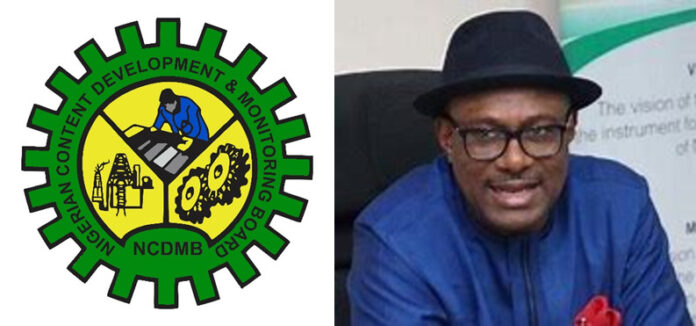By Simbi Wabote
I am delighted to have another opportunity to engage with this important segment of the media. This is the second edition of my parley with Editors of newspapers and Directors of broadcast stations, and I thank my Corporate Communications Team for putting this together.
The management of the Nigerian Content Development and Monitoring Board (NCDMB) was impressed with the outcome of the maiden engagement in February 2022 and we appreciate your reports on the various programmes.
We are equally grateful for the constructive criticisms as such criticisms enable us to rethink and retool our processes and improve our deliverables to our stakeholders.
With the support of the media and other oil and gas industry players, we have received some deserved commendations for the innovative initiatives we implement and the modest achievements we have recorded these past years.
Some of the notable recognitions we received in the last 18 months include the award by the Presidential Enabling Business Environment Council (PEBEC) as the most efficient agency among all the Ministries, Departments and Agencies (MDAs) of the Federal Government in 2022.
We are also rated PLATINUM by the Bureau for Public Service Reforms in recognition of the self-imposed reforms of our processes.
In addition, the Executive Secretary was recognized in October 2022 by former President Muhammadu Buhari with the “Distinguished Capacity Development Award” at the Nigeria Excellence Award in Public Service (NEAPS).
These awards have challenged us to redouble our efforts to deepen Nigerian content in the oil and gas industry and the linkage sectors and to continue to contribute to the growth of our national economy.
One of our important most and successful initiatives is the Service Level Agreement (SLA) we have with key entities in the Nigerian oil and gas industry.
We initiated this concept in 2017 to shorten the contracting cycle in the Nigerian oil and gas industry from an uncertain 2 to 3 years period to 6 months.
Our goal was to spur the speedy development of new oil and gas projects, ensure compliance with the provisions of the Nigerian Content Act and guarantee timely approvals of Nigerian content documents.
Our objectives were also to facilitate ease of doing business, set new standards of quality service delivery in the public and private sectors and provide evidence that the Nigerian Content Development and Monitoring Board is not a mere regulator, but essentially a business enabler.
These aspirations are even more urgent today to arrest the monumental decline in our nation’s oil production numbers and to support President Bola Tinubu in every possible way to achieve the economic policies in his Renewed Hope Agenda.
Contrary to the popular view, the unfortunate stealing of our crude oil by vandals is not the only reason for Nigeria’s low production numbers and the decrease in our foreign exchange earnings.
Our nation’s production deficit is partly caused by the lack of major investments in the past decade, declining oil production from aging oil fields, and the clamour for energy transition which caused international oil companies to cut back on new projects.
There is also the emergence of attractive oil-producing nations in Africa and across the globe, leading to intense competition for investment capital. These challenges were worsened by the delay in the enactment of the Petroleum Industry Act (PIA) and of course the long contracting cycle time.
At the NCDMB, we took bold steps to use the SLA to cut down time in all our touch points during pre-qualification, bidding, and award stages of the oil and gas tenders, starting with Nigeria LNG Limited in June 2017.
That SLA with the Nigeria LNG was the first of its kind between a regulator and another entity in the Nigerian oil and gas industry.
The implementation ensured that we broke a record for the shortest contract approval period.
Before we instituted the SLA, we had already introduced the 15-Day Rule to the industry in 2017, where we promised that we would respond within 15 working days to any formal request for approvals that relate to oil industry projects execution. The 15-Day Rule also permitted operators to go ahead with their projects if we fail to respond to their request after 15 days.
As further proof of our commitment to a short contracting cycle, we achieved a 14-month contract approval record on the Zabazaba and Etan deep water projects which was promoted by the Nigerian Agip Exploration, in partnership with SNEPCo. We had accomplished this record before the project was suspended due to non-technical reasons.
We are extremely delighted that our SLA template has been adopted across the entire oil and gas industry through the Memorandum of Understanding (MoU) and the SLA we signed last week with the Nigerian National Petroleum Company Limited (NNPCL) and five international oil-producing companies.
Other participating companies in the SLA included Shell Petroleum Development Company (SPDC), ExxonMobil, Chevron Nigeria, Nigerian Agip Exploration and Total Exploration and Production Nigeria.
We also have a separate SLA with the Indigenous Petroleum Producer Group (IPPG) which we signed in October 2018.
Last week’s SLA signing is the climax of the adoption of the initiative and we commend the management of the NNPCL for their participation.
With the position of the NNPCL as the senior partner in the joint ventures (JV) and concessionaire of the production sharing contracts (PSC) arrangements, the chances of achieving the 6-month target period and other aspirations of the SLA look very bright.
Distinguished ladies and gentlemen of the media, the theme of our engagement today is Sustaining Nigerian Content Amidst Divestments to Indigenous Oil Companies: The Role of the Media.
We decided on the theme because of the growing profile of Nigerian operating companies through their recent acquisitions or planned acquisitions of key assets divested by some international oil companies.
Currently, two major divestments are on the cards which would change Seplat Plc and Oando Plc from midsized players into big-time operating companies.
Seplat Plc is hoping to conclude the acquisition of the entire share capital of Mobil Producing Unlimited (MPNU) from ExxonMobil Corporation, a deal that would triple Seplat’s production and add 95,000 barrels of oil equivalent per day.
Similarly, Eni signed an agreement last month to sell Nigerian Agip Oil Company Limited (NAOC) to Oando Plc, a deal that will include NAOC’s 4 onshore blocks, the Okpai 1 and 2 power plants, and two onshore exploration leases. The transaction will double Oando’s reserves to 996 million barrels of oil equivalent.
What is playing out is the implementation of the oil majors’ strategic move to sell down their onshore assets in Nigeria and concentrate on their offshore operations, where they retain a competitive advantage and contend with minimal human interferences.
The implication is that we should expect other majors to soon offer their onshore assets for sale, while many other Nigerian independents will have a shoe-in.
The on-going and planned divestments are big accomplishments for Nigerian content development. They are bold statements that Nigerian indigenous operating companies have come of age and have acquired the technical, managerial, and financial capabilities to play in the big league.
We are proud that we have moved from near zero participation in the oil and gas sector to the point that our indigenous operators such as SEPLAT, AITEO, EROTON, and others are now responsible for 15% of our oil production and 60% of our domestic gas supply.
With this planned acquisition, the share of local firms in crude oil production could reach 30 per cent or more in a short while.
It is heart-warming to see our local operating companies deploy ingenious techniques to double and sometimes triple production volumes from their acquired assets and apply home grown solutions in addressing host community concerns.
But beyond the positives, it must also be observed that the divestment of producing assets to indigenous players poses significant challenges for the implementation of the Nigerian Oil and Gas Industry Content Development Act.
The worries are predicated on research findings and our experience in implementing the NOGICD Act in the past 13 years which indicates that indigenous firms, especially the indigenous operating companies are serial violators of the Nigerian Content Act.
In many instances, international operators tend to comply with the Nigerian content because it is in their DNA to obey laws or they have to show evidence of compliance to their home offices.
On the contrary, so many indigenous companies feel entitled and assume they can get away with non-compliance. At other times, they want to save costs to the detriment of the local economy.
Some of indigenous companies have also argued that they should be excluded from the implementation of the NOGICD Act since their primary investors are Nigerians.
Some of the common violations by indigenous firms range from executing projects without obtaining prior approvals, non-execution of mandatory Human Capacity Development Initiative (HCDI), non-utilization of vendors without approved Nigerian Content Equipment Certificate (NCEC) and utilization of the services of contractors that are not registered on the Nigerian Oil and Gas Industry Joint Qualification System Portal (NOGIC JQS) and several other violations.
Other times, the firms fail to remit their 1% mandatory Nigerian Oil Content Development Fund and engage expatriates without requisite approvals from the Board or even award contracts to foreign firms, even when other Nigerian companies can execute.
It is very surprising to see local companies undermine and flout the Nigerian Content Act despite being the immediate beneficiaries of the Nigerian content policy, thereby causing capital flight, loss of jobs, and opportunity for technological development.
While we commend the indigenous companies that are gearing up to acquire the divested assets, it is pertinent to remind all stakeholders of the industry that the provisions of the Nigerian content cover all entities and all activities connected to the Nigerian oil and gas industry.
While we will continue to study the changing ownership dynamics in the industry, the Board will continue to partner with the industry stakeholders to institute regulations that will ensure that the increasing footprints and stakes of indigenous production companies will not lead to a reduction in Nigerian content compliance and participation of Nigerians in the industry.
In this regard, I will solicit the media to continue its advocacy for Nigerian content compliance by all stakeholders of the industry.
Always remember that the Nigerian content implementation is a marathon, and we will require all hands to be on deck to ensure that the benefits of the oil and gas industry are retained maximally in Nigeria.
Thank you all for your attention.
*Simbi Wabote, an engineer, is the Executive Secretary, Nigerian Content Development and Monitoring Board (NCDMB) and he presented this speech at a breakfast meeting with Editors of newspapers and Directors of broadcast stations at Continental Hotel, Abuja recently.











